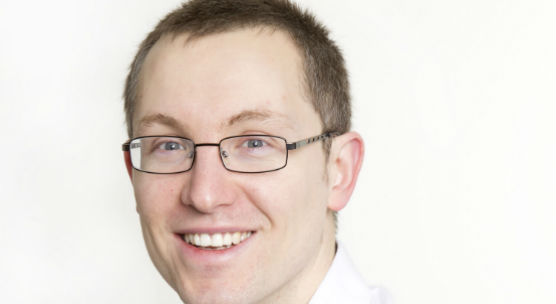Dundee academic honoured for `outstanding’ research
Published On Mon 10 Apr 2017 by Roddy Isles

Dr James Chalmers, of the University of Dundee, has been awarded the Patrick Neill Medal by the Royal Society of Edinburgh for his outstanding research work on respiratory infections and his expertise in bronchiectasis.
The Patrick Neill Medal is one of the RSE’s major prizes for early career researchers in Scotland.
Dr Chalmers is a Discovery Fellow and Honorary Consultant Physician in the Division of Molecular and Clinical Medicine, part of the University’s School of Medicine.
He is leading the University’s contribution to a €50 million, Europe-wide, project to develop new drugs that could improve the lives of patients with cystic fibrosis and bronchiectasis and has published research identifying new opportunities for diagnosis and treatment for patients with COPD.
“I am delighted to receive the Patrick Neill Medal from the Royal Society of Edinburgh,” said Dr Chalmers. “This is hugely encouraging not just for me but for colleagues in the Medical School, that we are contributing research which is having real impact and can benefit patients around the world.”
Dr Patrick Neill (1776 - 1851) was a distinguished Scottish Naturalist and Fellow of the RSE. He was born in Edinburgh and spent his life in the city. He became the head of the large printing firm of Neill & Co but early in his career he devoted his spare time to natural history, especially botany and horticulture.
Dr Neill was the first secretary of the Wernerian Natural History Society and the Caledonian Horticultural Society, holding the latter post for forty years. His “Tour through Orkney and Shetland,” appeared in 1806, a work which gave rise to much discussion, owing to its exposure of the then prevalent misery. He was also the author of the article “Gardening” in the seventh edition of the “Encyclopædia Britannica,” which, subsequently published under the title of “The Flower, Fruit, and Kitchen Garden,” and ran through several editions. Edinburgh is indebted to Neill for the scheme of the West Princes Street gardens. In 1820 that portion of the north loch was drained, and five acres of ground were laid out and planted with seventy-seven thousand trees and shrubs under his direction; it was also due to his public spirit that several antiquities were preserved when on the point of being demolished. In 1851 Dr Neill left a charitable bequest to the RSE and he is botanically commemorated by the rosaceous genus Neillia.
The Royal Society of Edinburgh’s annual prizes aim to recognise Scotland’s most remarkable academic talent.
Professor Dame Jocelyn Bell Burnell, President of the RSE, said, “To this year’s RSE Prize-winners I offer my warmest congratulations. Along with previous recipients, they have made truly outstanding contributions to their different disciplines, and in doing so, they reflect the RSE’s remit to support the advancement of learning and useful knowledge. Hailing from diverse disciplines, the 2017 RSE Prize-winners highlight the vitality and scope of Scotland’s academic and professional sector.”
Notes to Editors
The University of Dundee is one of the world’s top 200 universities and in 2016 was named Scottish University of the Year for the second consecutive year (Sunday Times Good University Guide).
Dundee is internationally recognised for the quality of its teaching and research and has a core mission to transform lives across society. We are the top ranked university in the UK for biological sciences research, according to the most recent Research Excellence Framework, the major survey of research quality.
See www.dundee.ac.uk for further details.
About the RSE
The Royal Society of Edinburgh is a leading educational charity which operates on an independent and non-party-political basis to provide public benefit throughout Scotland. Established by Royal Charter in 1783 by key proponents of the Scottish Enlightenment, the RSE now has around 1600 Fellows from a wide range of disciplines. The work of the RSE includes awarding research funding, leading on major inquiries, informing public policy and delivering events across Scotland to inspire knowledge and learning.
The RSE’s Fellowship comprises Honorary Fellows (members of the Royal House or persons eminently distinguished in any subject within our disciplinary domains), Corresponding Fellows (those who have attained high international standing in any subject within our disciplinary domains, and are not normally resident in the UK) and Fellows.
For media enquiries contact:
Roddy Isles
Head of Corporate Communications
University of Dundee
Nethergate, Dundee, DD1 4HN
Tel: +44 (0)1382 384910
Mobile: 07800 581902
Email: r.isles@dundee.ac.uk